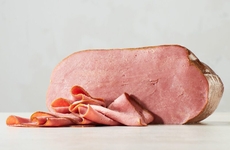
The CytoNest CytoSurge 3D Fiber Scaffold is Edible
Michael Hemsworth — August 8, 2024 — Lifestyle
The CytoNest CytoSurge 3D fiber scaffold is a new solution from the startup that started at the University of Georgia (UGA) in the US that's targeted towards cell manufacturing and tissue engineering protocols.
The product is suited for use in meat and seafood development as well as biopharmaceuticals, cell research and cell therapeutics. The product was developed into a prototype after almost a decade of research, publications and patenting by CEO Nataraja Yadavalli and CSO Sergiy Minko. The edible scaffold fibers would allow meat and seafood cells with a basis to build on, and could be used at scale.
The CytoNest CytoSurge 3D fiber scaffold utilizes a proprietary fiber drawing technology that will fuse one layer overtop of another in sequence to achieve the perfect setup for cell cultures to grow.
The product is suited for use in meat and seafood development as well as biopharmaceuticals, cell research and cell therapeutics. The product was developed into a prototype after almost a decade of research, publications and patenting by CEO Nataraja Yadavalli and CSO Sergiy Minko. The edible scaffold fibers would allow meat and seafood cells with a basis to build on, and could be used at scale.
The CytoNest CytoSurge 3D fiber scaffold utilizes a proprietary fiber drawing technology that will fuse one layer overtop of another in sequence to achieve the perfect setup for cell cultures to grow.
Trend Themes
1. Edible Scaffolding - An innovative approach that facilitates the growth of meat and seafood cells on consumable structures, enhancing both the product's safety and usability.
2. 3D Fiber Drawing Technology - A breakthrough technology that involves layering fibers in a precise sequence, creating an optimal environment for cell culture development.
3. Scalable Cell-based Meat Production - The ability to produce cell-based meat at scale addresses future food security challenges and meets rising demands for sustainable protein sources.
Industry Implications
1. Meat Alternative Industry - The development of edible scaffolding presents a significant advancement in creating realistic meat alternatives, potentially transforming the market.
2. Biopharmaceutical Industry - Utilizing 3D fiber drawing technology in cell therapeutics could lead to more effective and scalable treatments in regenerative medicine.
3. Cell Research - Innovations in scaffold materials and cell culture environments streamline research processes, accelerating discoveries in cellular biology.
5.5
Score
Popularity
Activity
Freshness
























